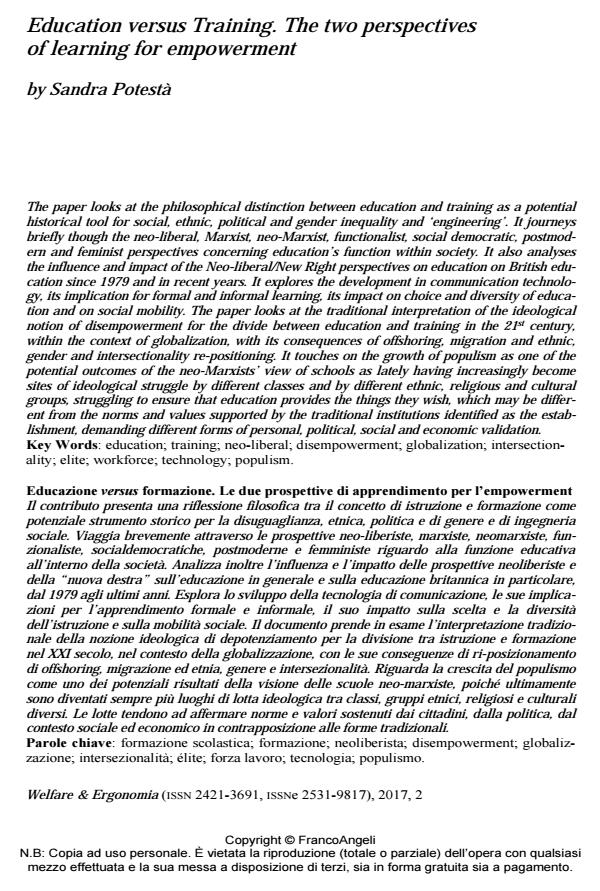Education versus Training. The two perspectives of learning for empowerment
Titolo Rivista WELFARE E ERGONOMIA
Autori/Curatori Sandra Potestà
Anno di pubblicazione 2019 Fascicolo 2017/2
Lingua Inglese Numero pagine 37 P. 13-49 Dimensione file 812 KB
DOI 10.3280/WE2017-002002
Il DOI è il codice a barre della proprietà intellettuale: per saperne di più
clicca qui
Qui sotto puoi vedere in anteprima la prima pagina di questo articolo.
Se questo articolo ti interessa, lo puoi acquistare (e scaricare in formato pdf) seguendo le facili indicazioni per acquistare il download credit. Acquista Download Credits per scaricare questo Articolo in formato PDF

FrancoAngeli è membro della Publishers International Linking Association, Inc (PILA)associazione indipendente e non profit per facilitare (attraverso i servizi tecnologici implementati da CrossRef.org) l’accesso degli studiosi ai contenuti digitali nelle pubblicazioni professionali e scientifiche
The paper looks at the philosophical distinction between education and training as a potential historical tool for social, ethnic, political and gender inequality and ‘engineering’. It journeys briefly though the neo-liberal, Marxist, neo-Marxist, functionalist, social democratic, postmodern and feminist perspectives concerning education’s function within society. It also analyses the influence and impact of the Neo-liberal/New Right perspectives on education on British education since 1979 and in recent years. It explores the development in communication technology, its implication for formal and informal learning, its impact on choice and diversity of education and on social mobility. The paper looks at the traditional interpretation of the ideological notion of disempowerment for the divide between education and training in the 21st century, within the context of globalization, with its consequences of offshoring, migration and ethnic, gender and intersectionality re-positioning. It touches on the growth of populism as one of the potential outcomes of the neo-Marxists’ view of schools as lately having increasingly become sites of ideological struggle by different classes and by different ethnic, religious and cultural groups, struggling to ensure that education provides the things they wish, which may be different from the norms and values supported by the traditional institutions identified as the establishment, demanding different forms of personal, political, social and economic validation.
Il contributo presenta una riflessione filosofica tra il concetto di istruzione e formazione come potenziale strumento storico per la disuguaglianza, etnica, politica e di genere e di ingegneria sociale. Viaggia brevemente attraverso le prospettive neo-liberiste, marxiste, neomarxiste, funzionaliste, socialdemocratiche, postmoderne e femministe riguardo alla funzione educativa all’interno della società. Analizza inoltre l’influenza e l’impatto delle prospettive neoliberiste e della "nuova destra" sull’educazione in generale e sulla educazione britannica in particolare, dal 1979 agli ultimi anni. Esplora lo sviluppo della tecnologia di comunicazione, le sue implicazioni per l’apprendimento formale e informale, il suo impatto sulla scelta e la diversità dell’istruzione e sulla mobilità sociale. Il documento prende in esame l’interpretazione tradizionale della nozione ideologica di depotenziamento per la divisione tra istruzione e formazione nel XXI secolo, nel contesto della globalizzazione, con le sue conseguenze di ri-posizionamento di offshoring, migrazione ed etnia, genere e intersezionalità. Riguarda la crescita del populismo come uno dei potenziali risultati della visione delle scuole neo-marxiste, poiché ultimamente sono diventati sempre più luoghi di lotta ideologica tra classi, gruppi etnici, religiosi e culturali diversi. Le lotte tendono ad affermare norme e valori sostenuti dai cittadini, dalla politica, dal contesto sociale ed economico in contrapposizione alle forme tradizionali.
Parole chiave:Formazione scolastica; formazione; neoliberista; disempowerment; globaliz-zazione; intersezionalità; élite; forza lavoro; tecnologia; populismo.
Sandra Potestà, Education versus Training. The two perspectives of learning for empowerment in "WELFARE E ERGONOMIA" 2/2017, pp 13-49, DOI: 10.3280/WE2017-002002